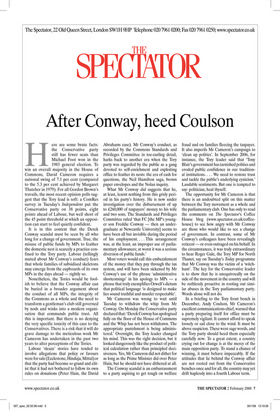After Conway, heed Coulson
Here are some brute facts: the Conservative party still has fewer seats than Michael Foot won in the 1983 general election. To win an overall majority in the House of Commons, David Cameron requires a national swing of 7.1 per cent (compared to the 5.3 per cent achieved by Margaret Thatcher in 1979). For all Gordon Brown’s travails, the most recent opinion polls suggest that the Tory lead is soft: a ComRes survey in Tuesday’s Independent put the Conservative party on 38 points, eight points ahead of Labour, but well short of the 45 point threshold at which an opposition can start to feel quietly confident.
It is in this context that the Derek Conway scandal must be seen by all who long for a change of government. True, the misuse of public funds by MPs to feather the domestic nest is scarcely a practice confined to the Tory party. Labour (tellingly muted about Mr Conway’s conduct) fears that whole families of subsidised skeletons may emerge from the cupboards of its own MPs in the days ahead — rightly so.
Nonetheless, the Tories would be foolish to believe that the Conway affair can be buried in a broader argument about the conduct of all MPs, the integrity of the Commons as a whole and the need to transform a gentleman’s club still governed by nods and winks into a modern organisation that commands public trust. All this is important. But there is no denying the very specific toxicity of this case to the Conservatives. There is a risk that it will do grave damage to the meticulous work Mr Cameron has undertaken in the past two years to alter perceptions of the Tories.
Labour ‘sleaze’ stories have tended to involve allegations that policy or favours were for sale (Ecclestone, Hinduja, Mittal) or that the party had become so grand and elitist that it had not bothered to follow its own rules on donations (Peter Hain, the David Abrahams case). Mr Conway’s conduct, as recorded by the Commons Standards and Privileges Committee in toe-curling detail, harks back to another era when the Tory party was regarded by the public as a gang devoted to self-enrichment and exploiting office to feather its nests: the era of cash for questions, the Neil Hamilton saga, brown paper envelopes and the Nolan inquiry.
What Mr Conway did suggests that he, at least, learnt nothing from this grisly period in his party’s history. He is now under investigation over the disbursement of up to £260,000 of taxpayers’ money to his wife and two sons. The Standards and Privileges Committee ruled ‘that FC [the MP’s younger son Freddie Conway — then an undergraduate at Newcastle University] seems to have been all but invisible during the period of his employment.... This arrangement was, at the least, an improper use of parliamentary allowances; at worst it was a serious diversion of public funds.’ Most voters would call this embezzlement of the money that they pay through the tax system, and will have been sickened by Mr Conway’s use of the phrase ‘administrative shortcomings’ in his apology to MPs — a phrase that truly exemplifies Orwell’s dictum that political language ‘is designed to make lies sound truthful and murder respectable’.
Mr Cameron was wrong to wait until Tuesday to withdraw the whip from Mr Conway. On Monday the Conservative party declared that: ‘Derek Conway has apologised fully on the floor of the House of Commons and the Whip has not been withdrawn. The appropriate punishment is being administered.’ Overnight, the Tory leader changed his mind. This was the right decision, but it looked dangerously like the product of political calculation rather than principled decisiveness. Yes, Mr Cameron did not dither for as long as the Prime Minister did over Peter Hain, but he should not have dithered at all.
The Conway scandal is an embarrassment to a party aspiring to get tough on welfare fraud and on families fleecing the taxpayer. It also imperils Mr Cameron’s campaign to ‘clean up politics’. In September 2006, for instance, the Tory leader said that ‘Tony Blair’s government has tarnished politics and eroded public confidence in our traditional institutions.... We need to restore trust and tackle the public’s underlying cynicism.’ Laudable sentiments. But one is tempted to say: politician, heal thyself.
The opportunity for Mr Cameron is that there is an undoubted split on this matter between the Tory movement as a whole and the parliamentary club. One has only to read the comments on The Spectator’s Coffee House blog (www.spectator.co.uk/coffeehouse) to see how angry with Mr Conway are those who would like to see a change of government. In contrast, some of Mr Conway’s colleagues have been revealingly reticent — or even outraged on his behalf. In the circumstances, it was truly extraordinary to hear Roger Gale, the Tory MP for North Thanet, say on Tuesday’s Today programme that Mr Conway was the victim of a ‘witchhunt’. The key for the Conservative leader is to show that he is unequivocally on the side of the movement in the country and will be ruthlessly proactive in rooting out similar abuses in the Tory parliamentary party. Words alone will not do.
In a briefing to the Tory front bench in December, Andy Coulson, Mr Cameron’s excellent communications chief, warned that a party preparing itself for office must be supremely vigilant. It cannot afford to speak loosely or sail close to the wind. It must be above suspicion. These were sage words, and the Tory party should heed them especially carefully now. To a great extent, a country crying out for change is at the mercy of the main opposition party. To stand a chance of winning, it must behave impeccably. If the attitudes that lie behind the Conway affair are not rooted out from the Conservative benches once and for all, the country may yet drift haplessly into a fourth Labour term.


































































 Previous page
Previous page